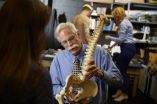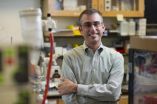Shutting off blood supply to an extremity to protect the heart
Preparing the body for an upcoming challenge
2014-10-24
(Press-News.org) In a study just published in the International Journal of Cardiology, researchers from the K.G. Jebsen Center for Exercise in Medicine – Cardiac Exercise Research Group (CERG) at the Norwegian University of Science and Technology (NTNU) and the Department of Cardiothoracic Surgery at the St. Olavs Hospital in Trondheim, Norway have shown that shutting off the blood supply to an arm or leg before cardiac surgery protects the heart during the operation.
The research group wanted to see how the muscle of the left chamber of the heart was affected by a technique, called RIPC (remote ischemic preconditioning), during cardiac surgery. RIPC works by shutting off the blood supply to an arm or a leg before heart surgery. The goal is to reduce risk during cardiac surgery in the future.
The technique is not new, but its effects have never before been tested directly on the left chamber of the heart.
"During heart surgery we have to stop the blood supply to the heart to be able to operate on it. After some time without fresh blood, the heart will reduce its ability to produce energy because it doesn't get oxygen. When we shut off the blood flow to another large muscle, such as an arm or a leg, the body prepares for an upcoming challenge by mobilizing its defense system", says the first author of the study, Katrine Hordnes Slagsvold, a PhD candidate at NTNU and medical doctor at St. Olav's Hospital.
The researchers investigated cardiac tissue from 60 patients who had coronary bypass surgery at St. Olavs Hospital in Trondheim. The patients were randomized to either undergo RIPC, or to a control group.
Patients who were treated with RIPC underwent brief periods without blood supply to the arm before surgery, by inflating a blood pressure cuff for five minutes three times.
"The heart muscle of the patients who had restricted blood flow to their arm before surgery was able to maintain the same level of energy production during the whole operation, while heart muscle from the other patients' hearts was not. This may be important because heart tissue is dependent on energy to survive, as well as to repair injuries the cells may have endured during surgery," Slagsvold says.
The researchers also found that a protein called Akt was activated after RIPC, and believe that activation of this protein may be key in inducing the protective effect on the heart.
INFORMATION:
ELSE PRESS RELEASES FROM THIS DATE:
2014-10-24
Endurance athletes taking part in triathlons are at risk of the potentially life-threatening condition of swimming-induced pulmonary oedema. Cardiologists from Musgrove Park Hospital, Taunton, writing in the Journal of the Royal Society of Medicine, say the condition, which causes an excess collection of watery fluid in the lungs, is likely to become more common with the increase in participation in endurance sports. Increasing numbers of cases are being reported in community triathletes and army trainees. Episodes are more likely to occur in highly fit individuals undertaking ...
2014-10-24
Six Case Western Reserve scientists are part of an international team that has discovered two compounds that show promise in decreasing inflammation associated with diseases such as ulcerative colitis, arthritis and multiple sclerosis. The compounds, dubbed OD36 and OD38, specifically appear to curtail inflammation-triggering signals from RIPK2 (serine/threonine/tyrosine kinase 2). RIPK2 is an enzyme that activates high-energy molecules to prompt the immune system to respond with inflammation. The findings of this research appear in the Journal of Biological Chemistry.
"This ...
2014-10-24
Newly published findings from the University of Waterloo are giving women with bad backs renewed hope for better sex lives. The findings—part of the first-ever study to document how the spine moves during sex—outline which sex positions are best for women suffering from different types of low-back pain. The new recommendations follow on the heels of comparable guidelines for men released last month.
Published in European Spine Journal, the female findings debunk the popular belief that spooning—where couples lie on their sides curled in the same direction—is ...
2014-10-24
Down syndrome is the most common chromosomal abnormality in humans, involving a third copy of all or part of chromosome 21. In addition to intellectual disability, individuals with Down syndrome have a high risk of congenital heart defects. However, not all people with Down syndrome have them – about half have structurally normal hearts.
Geneticists have been learning about the causes of congenital heart defects by studying people with Down syndrome. The high risk for congenital heart defects in this group provides a tool to identify changes in genes, both on and ...
2014-10-24
In early drug discovery, you need a starting point, says Northeastern University associate professor of chemistry and chemical biology Michael Pollastri.
In a new research paper published Thursday in the journal PLOS Neglected Tropical Diseases, Pollastri and his colleagues present hundreds of such starting points for potentially treating African sleeping sickness, a deadly disease that claims thousands of lives annually.
Pollastri, who runs Northeastern's Laboratory for Neglected Disease Drug Discovery, ...
2014-10-24
WASHINGTON – October 24, 2014 – Policy options for climate change risk management are straightforward and have well understood strengths and weaknesses, according to a new study by the American Meteorological Society (AMS) Policy Program.
"Large gaps remain in society's consideration of climate policy," said Paul Higgins, the author of the study. "This study can help in the development of a comprehensive strategy for climate change risk management because it explores a much larger set of policy options."
The study identifies four categories of climate ...
2014-10-24
Washington, D.C., October 24, 2014 -- Only 6 percent of U.S. hospitals are well-prepared to receive a patient with the Ebola virus, according to a survey of infection prevention experts at U.S. hospitals conducted October 10-15 by the Association for Professionals in Infection Control and Epidemiology (APIC).
The survey asked APIC's infection preventionist members, "How prepared is your facility to receive a patient with the Ebola virus?" Of the 1,039 U.S.-based respondents working in acute care hospitals, about 6 percent reported their facility was well-prepared, while ...
2014-10-24
LAWRENCE – 'Call your mother' may be the familiar refrain, but research from the University of Kansas shows that being able to text, email and Facebook dad may be just as important for young adults.
Jennifer Schon, a doctoral student in communication studies, found that adult children's relationship satisfaction with their parents is modestly influenced by the number of communication tools, such as cell phones, email, social networking sites, they use to communicate.
Schon had 367 adults between the ages of 18 and 29 fill out a survey on what methods of communications ...
2014-10-24
VIDEO:
The Jones lab details a new target to fighting HIV.
Click here for more information.
LA JOLLA—Like a slumbering dragon, HIV can lay dormant in a person's cells for years, evading medical treatments only to wake up and strike at a later time, quickly replicating itself and destroying the immune system.
Scientists at the Salk Institute have uncovered a new protein that participates in active HIV replication, as detailed in the latest issue of Genes & Development. ...
2014-10-24
Spectacular eruptions at Bárðarbunga volcano in central Iceland have been spewing lava continuously since Aug. 31. Massive amounts of erupting lava are connected to the destruction of supercontinents and dramatic changes in climate and ecosystems.
New research from UC Davis and Aarhus University in Denmark shows that high mantle temperatures miles beneath the Earth's surface are essential for generating such large amounts of magma. In fact, the scientists found that the Bárðarbunga volcano lies directly above the hottest portion of the North Atlantic ...
LAST 30 PRESS RELEASES:
[Press-News.org] Shutting off blood supply to an extremity to protect the heart
Preparing the body for an upcoming challenge


